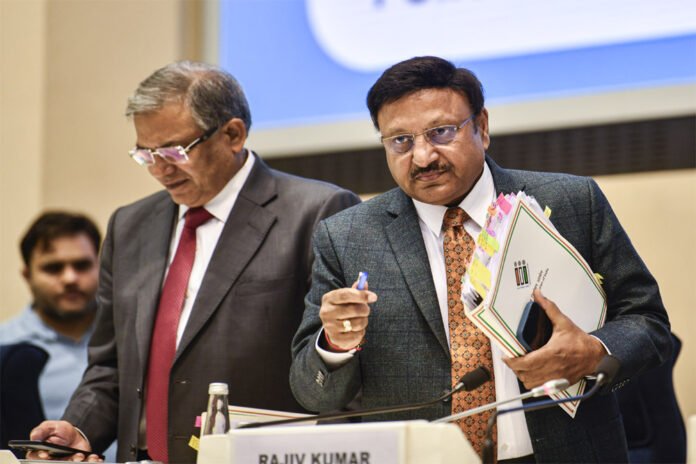Every time the Election Commission announces election programmes, many shortcomings come to the fore. Like last time it had to extend the date of voting in Haryana. Before that, at the time of Lok Sabha elections, it had to get the counting of voting done for Sikkim and Arunachal Pradesh assembly elections two days in advance. Don’t know whether the Election Commission does all this deliberately or its work is done in a casual manner? But this time also when it has announced the assembly elections of Maharashtra and Jharkhand, the election schedule of Maharashtra is going to raise questions. The Commission has left a window of only three days to form the government in the state.
It is noteworthy that the tenure of Maharashtra Assembly is ending on 26th November. This means that by that day a new assembly should be constituted in the state and a new government should be formed. If for any reason this does not happen then President’s rule will have to be imposed in the state. It needs to be kept in mind that the elections in Maharashtra are going to be very closely fought and last time also everyone had seen how much time was taken to form the government. Shiv Sena, which fought with BJP, was adamant that it wanted the post of Chief Minister for two and a half years. After that suddenly early one day the Governor administered the oath to Devendra Fadnavis and Ajit Pawar. Then within a week both of them resigned and with the help of Congress and NCP, Uddhav Thackeray became the Chief Minister. After two and a half years, Shiv Sena broke, the government fell and Eknath Shinde became CM with the support of BJP.
The question is that in a state where so much political drama takes place after the electoral alliance gets absolute majority, it can be easily imagined how much suspense there will be regarding the election result and government formation in the competition between two alliances of six big parties. But the Election Commission did not think about this. The question is whether the Election Commission has deliberately kept the voting in Maharashtra on 20th November and the counting on 23rd November so that if it takes time to form the government, President’s rule will be imposed immediately? This question arises because if the Election Commission had worked wisely, it would not have made such a schedule.
After all, he has not done it in the case of Haryana and Jharkhand. The tenure of the Haryana Assembly was till November 3, so it held voting there along with Jammu and Kashmir and the results came on October 8 itself. Similarly, the tenure of Jharkhand Assembly is till January 5, 2025 but there too the counting will take place on November 23. Why was this kind of window not given to Maharashtra? What was the compulsion that the Election Commission did not conduct elections in Maharashtra along with Haryana and Jammu and Kashmir? There is also a question that when there will be simultaneous voting on 288 seats in Maharashtra, then why will voting on 81 seats in Jharkhand be held in two phases and why will there be a gap of seven days between the two phases? If the Commission had wanted, the elections for all the seats in both the states would have been held on November 13, the day of the first phase of voting in Jharkhand, and the results would have come on November 16. But he didn’t do that. The result is that after the results in Maharashtra, government will have to be formed within three days otherwise President’s rule will be imposed. And there is no need to say who will benefit in such a situation.

